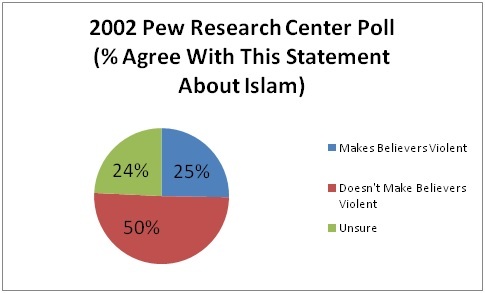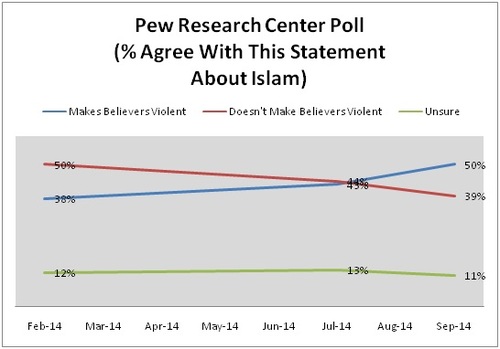
When ISIS started beheading Americans, did it change public attitudes in the Middle East in general, and Islam in particular? Recent polls have suggested a dramatic shift in public attitudes.
It may surprise you to learn that even after 9/11, few Americans thought Muslims were encouraging violence as part of their religious doctrine. A poll question asked by the Pew Research Center asked "Which statement is closer to your views, even if neither is exactly right? The Islamic religion is more likely to encourage violence among its believers, or The Islamic religion does not encourage violence more than others. Of those responding in March of 2002, only 25 percent of Americans thought Islam incited its members to violence. Half thought Islam does not encourage such violence among its adherents, with the remainder being unsure.
That seems to have changed, in the wake of high profile beheadings in Iraq, Syria and other cases where such events are videotaped and displayed in the media. Such numbers of Americans associating Islam with violence rose during the Iraq War. Those who feel Muslims are incited to violence by their religion fell after the Iraq withdrawal to only 38 percent in February of 2014. But now, in September of 2014, that numbers has grown to 50 percent, mostly likely associated with the violent beheadings conducted by ISIS fighters, and captured on videotape. The results can be found at pollingreport.com at Pollingreport.com/religion.htm.
Where do these views come from? In the past, scholars have thought of religious factors as motivating American public opinion on Islam and Iraq. In the journal Sociology of Religion, Corwin E. Smidt from the Paul B. Henry Institute for the Study of Christianity and Politics at Calvin College in Grand Rapids, Michigan found that while most Americans supported removing Saddam Hussein from power in Iraq.
He writes:
Responses to the removal of Hussein still clearly were colored by religious factors. Religious factors also shaped support for invading Iraq and views of Islam as a violent religion. The important effects of religion on such issues hold even in light of multivariate analyses, as religious variables tended to rival political variables and usually exceeded socio-demographic variables in explaining differences on such issues.
Jody Baumgartner, Peter Francia and Jonathan Morris, from East Carolina University, go on to point out that Evangelical Christians are more likely to back an aggressive foreign policy in the Middle East, and to have negative views of Islam, as noted in their article in Political Research Quarterly. Writing in the International Journal of Public Opinion Research, Ammon Cavari (a visiting scholar from Israel) finds that such religious views toward the Middle East and Israel are becoming aligned with partisan identifiers.
But that doesn't explain the recent change in attitudes toward Islam, Iraq and Syria, unless a lot more people have become Evangelical Christians, or that moderates are coming to the same conclusion. And if Cavari is right, that could mean a more conservative electorate on the subject in the 2014 and 2016 elections.
--
John A. Tures is a professor of political science at LaGrange College in LaGrange, Ga. He can be reached at jtures@lagrange.edu.


